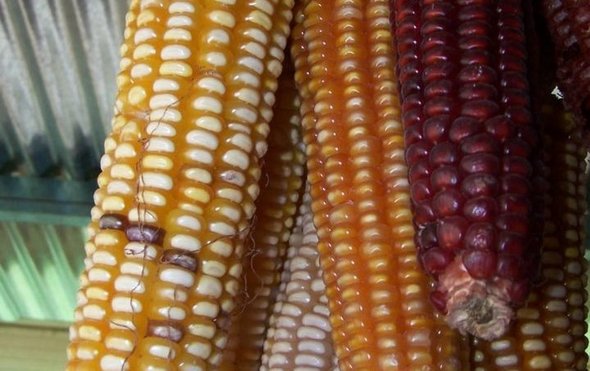(单词翻译:单击)
听力文本
This is Scientific American — 60-Second Science. I'm Christopher Intagliata.
Plants need three things to grow: air, water and nutrients. Farmers usually take care of the last bit by fertilizing their fields. But now scientists have found a type of corn that seems to thrive on air and water alone.
"This has been sort of the holy grail, you know, if only I could grow corn and not put 200 pounds of nitrogen on it." Allen Van Deynze is a plant breeder at the University of California, Davis, and part of a team that analyzed this one corn's unusual ability.
The corn variety hails from Oaxaca, Mexico, where it typically grows in nitrogen-poor soils. Nitrogen is needed for proteins, DNA and the chlorophyll that let plants perform photosynthesis. But the Oaxacan corn does well despite the bad soil, and with little or no fertilization.

The plants pull off this trick via thick, red, aerial roots that protrude from its stem—above the ground—that ooze out a clear goo packed with sugars. That slime is the perfect habitat for nitrogen-fixing bacteria: a sugar-rich, oxygen-poor environment where the microbes transform nitrogen gas into a soluble form the corn plant can use. It's an above-ground version of the nitrogen-fixation you might usually think of as happening in the underground roots of legumes, like peas and beans.
The researchers demonstrated the corn plants' talent by exposing them to labeled isotopes of nitrogen. And they were able to track the movement of the distinctly identifiable nitrogen atoms from the air, to the root, and into the plant. This pathway allows the corn to obtain up to 80 percent of its nitrogen straight out of the air. The details are in the journal PLOS Biology.
Van Deynze says early plant breeders may have inadvertently got rid of corn's nitrogen-fixing proficiency long ago. "When early man made some selections for, probably, you know, bigger ears, higher yield, perhaps they lost this ability along the way. And we have the opportunity perhaps to bring it back."
Thanks for listening for Scientific American — 60-Second Science. I'm Christopher Intagliata.
参考译文
这里是科学美国人——60秒科学。我是克里斯托弗·因塔利亚塔。
植物生长需要三种东西:空气、水和养分。农民一般通过给田地施肥来提供养分。但是现在科学家发现,有种玉米似乎只靠空气和水就能生长。
“如果能不用施200磅氮肥就能让玉米生长,那就像是圣杯一样。”艾·范·德恩兹是加州大学戴维斯分校的植物育种专家,他所在的团队对这种玉米不同寻常的能力进行了分析。
这种玉米源自墨西哥瓦哈卡州,通常在该州贫瘠的土壤中生长。氮是蛋白质、DNA和让植物进行光合作用的叶绿素所必需的。但是,尽管生长在极少甚至没有肥料的贫瘠土壤中,瓦哈卡州玉米依旧长得很好。
玉米通过其粗壮且呈红色的气生根来实现这一良好态势,这种气生根从玉米茎地表部分伸出,分泌出富含糖分的透明黏液。这种黏液是固氮细菌的完美栖息地:这是一种多糖且缺氧的环境,细菌在此将氮气转化为玉米植株可以利用的可溶性形式。这是一种发生在地表的固氮形式,可能你通常认为它发生在豌豆和蚕豆等豆类的地下根部。
研究人员让玉米接触带标记的氮同位素,以此来证明其才能。他们能追踪到有明显不同的氮元子的运动轨迹,从空气到根部最后进入玉米植株。这一路径使玉米中多达80%的氮可以直接从空气中获得。该研究具体内容刊登在《美国公共科学图书馆·生物学》期刊上。
范·德恩兹表示,早期植物育种家可能很早之前就在无意中去除了玉米的固氮能力。“当早期人类选择谷穗更大、产量更高的玉米时,也许就在这个过程中使玉米失去了固氮能力。而我们也因此得到了可以恢复这种能力的机会。”
谢谢大家收听科学美国人——60秒科学。我是克里斯托弗·因塔利亚塔。
译文为可可英语翻译,未经授权请勿转载!
重点讲解
重点讲解:
1. take care of 照顾;照看;看护;
He's old enough to take care of himself.
他已经不小了,能照顾自己了。
2. hail from 来自;
This is a film which seems to hail from the hippie era.
这看起来是一部嬉皮士时代的影片。
3. pull off 成功完成,做成(困难的事情);
We pulled off the deal.
我们做成了这笔交易。
4. transform into 转换;改变;改造;
The photochemical reactions transform the light into electrical impulses.
光化学反应使光变为电脉冲。


